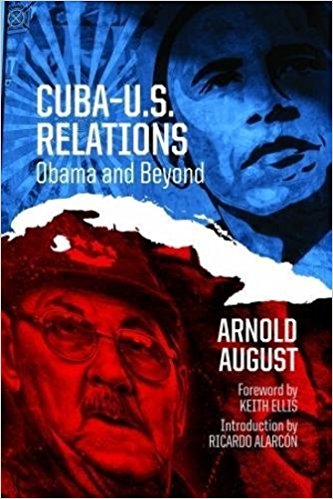Cuba–U.S. Relations: Obama and Beyond
A Book Review

The relations between Cuba and the neighboring United States, which have been tense ever since the Cuban revolution in 1959, have changed since 2014. The Canadian author and political scientist Arnold August outlines this transition in the bilateral relations in a well-founded book. The first of six chapters takes a long view back, beginning in 1783 during the formative years of the developing United States of America. The main focus of the book however is on the recent years and the current developments under U.S. Presidents Obama and Trump.
The second chapter discusses the period following the re-establishment of diplomatic relations from 2014 to 2016. Subsequently, August documents and interprets the internal and external challenges for Cuba in 2017 and beyond, among them the blockade and the role of the U.S. media. By focusing on exemplary events and developments, August provides insights into the relevant structures and factors that influence this complicated relationship.1
August shows how the 1959 revolution broke the U.S. hold over Cuba and how the U.S. has tried desperately (and many times violently) to regain its control over the island. Obama opened diplomatic ties with Cuba for the first time in 50 years. August explains what this opening means for both countries and where he sees U.S.–Cuba relations heading after the death of Fidel Castro and the rise of U.S. President Donald Trump.
He describes and analyzes Obama’s visit to Havana in the spring of 2016 and several media campaigns in the U.S. on Cuba. He discusses thoroughly the topics of human rights and democracy in Cuba, examining important documents and statements of both sides.
In addition, August reports on many incidents where the U.S. tried and still tries to induce political changes in Cuba. For example, both the U.S. and Spain actively support anti-Castro bloggers by providing them with ‘advice’. In Cuba itself, August writes, blogger ‘consultants’ attempt to ‘detour’ Cubans from the path of the Revolution: ‘Thus, the image of the dissidents is changing from one that has been discredited as mercenaries of the U.S. to another, younger sort. The new crop gives the impression that they are not interested in regime change funds. They are not easy to detect … targeting especially youth, artists, intellectuals and journalists.’ (62) According to the author, since the start of open and formal negotiations between the U.S. and Cuba this ‘new form’ of dissidence has been renovated.
For the quality of this book it is particularly helpful that August has excellent access and experience in both the U.S. and Cuba. This is emphasized by the breadth of sources considered and also by the fact that in Chapter 3 five intellectuals from Cuba, rarely presented and read in the West, present their different assessments of the changes in recent years. Those leading experts on Cuba–U.S. Relations are Jesús Arboleya Cervera, Esteban Morales Domínguez, Elier Ramírez Cañedo, Iroel Sánchez Espinosa and Luis Toledo Sande.
Those interviews take the form of in-depth- discussions and are highly informative and insightful. In the course of the book, U.S. policies towards Cuba are explained in the context of U.S. interests and national policies. The U.S.’ claims to having the right and the means to influence Cuba’s future development are described as still being powerful today.
This claim to dominance also guided President Obama’s policies, albeit in new forms, after having determined that the previous activities against Cuba had been unsuccessful and that a more positive image of the relationship was required. In August’s view, Obama changed the status quo through an increase in subtle domination policies. Flanked by travel concessions and remittances, Obama stimulated subversion policies and measures aimed at destabilizing Cuba’s constitutional order. August explains many complex aspects of the bilateral relationship. For instance, he questions why President Obama did not use his executive power to close Guantánamo prison, and analyzes ‘how political prisoners made the media headlines’. He labels some elements of the U.S. policies vis-à-vis Cuba as ideological or political war and tries to proof this assessment by several empirical cases.
For readers in the US and elsewhere the book provides an interesting and refreshing opportunity to read original voices from Cuba, like the introduction by Ricardo Alarcón de Quesada, Cuba’s former Foreign Minister and President of the National Assembly. In his introduction, Alarcón questions the overconfident attitude of the U.S. in its distrust of the democratic and human qualities of other countries and governments, whereas many of its own policies and activities are contradicting these very standards.
Under President Trump, many of the recent improvements in the U.S.-Cuban relationship are being withdrawn and communication is being curtailed. August describes the beginning of this degeneration process, but he also stresses the powerful anti- blockade forces.
This book is filled with facts, empirical evidence and interesting arguments that are usually not heard in Western mass media. It is one of the most detailed current studies about the new relations between the U.S. and Cuba and useful both as an introduction and as a deepening source for undergraduates and graduate students.
*
This article was originally published on ERLACS.
Edgar Göll, IZT Institute for Futures Studies and Technology, has been Co-Head of Research of the cluster “Future Studies and Participation” at IZT since 2014.
Note
1. For a more detailed interpretation of US-Cuban relations before 2010 see my review of the book by Jane Franklin Cuba and the US Empire in ERLACS 102, October 2016, pp. 133 – 134.

Title: Cuba–U.S. Relations: Obama and Beyond
Author: Arnold August
Publisher: Fernwood Books Ltd (May 1, 2017)
ISBN-10: 1552669653
ISBN-13: 978-1552669655
.
.
.

